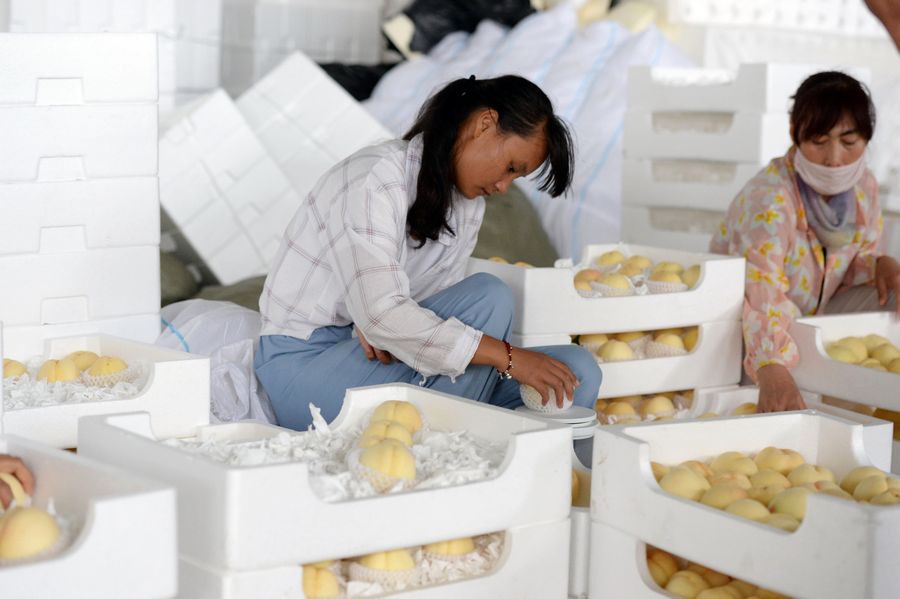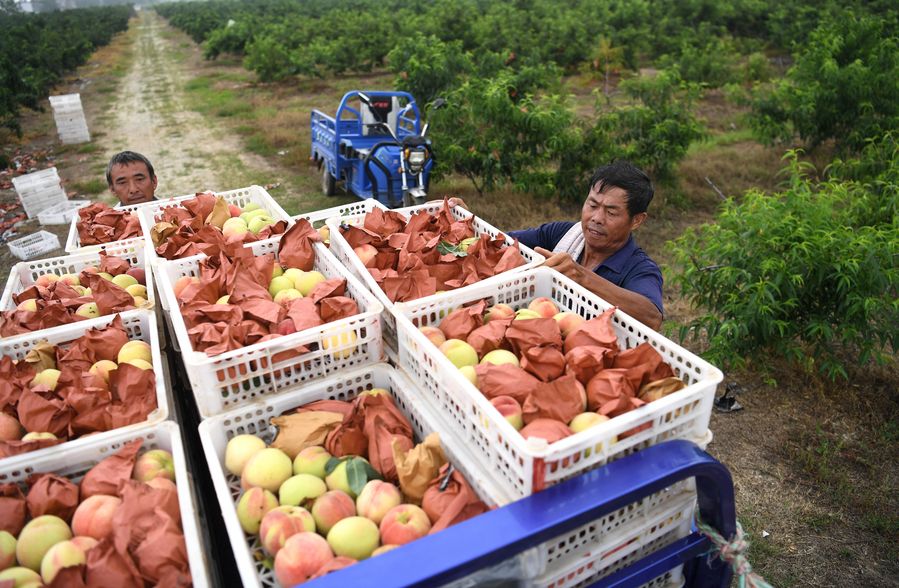
Farmers sort and pack peaches in Taipingji Village, Shiba Town, Mingguang City, east China's Anhui Province, July 17, 2019. In recent years, local authorities of Shiba Town have promoted peach planting to increase farmers' income. (Photo by Huang Bohan/Xinhua)
At present, nearly all fruit farmers are embracing e-commerce in Dangshan to boost their sales. Besides, their fruits sell for a higher price with e-commerce.
HEFEI, Oct. 17 (Xinhua) -- More than 500,000 kg of pears and yellow peaches were snapped up within one hour of coming online Thursday, a feat unthinkable just years ago in Dangshan County, east China's Anhui Province.
Dangshan County, with orchards covering more than 700,000 mu (about 47,000 hectares), has been cultivating pears for over 2,500 years. It even earned itself the title of "China's pear capital" thanks to its large planting area and high-quality fruits.
However, a bumper harvest did not always bring a good income for local farmers in the days of old. Sitting at the border of Anhui, Jiangsu, Shandong and Henan provinces, Dangshan is one of the least accessible areas in the province.
"I had to take my pears to the fruit market a dozen kilometers away every morning. Normally fruit dealers would force down the price if they wanted to buy," said Ji Rongzhong, the owner of an orchard in Dangshan.
In bad years, a large number of pears would end up rotting on the ground due to poor infrastructure and an imbalance between supply and demand.

Farmers load and transport peaches in Taipingji Village, Shiba Town, Mingguang City, east China's Anhui Province, July 17, 2019. In recent years, local authorities of Shiba Town have promoted peach planting to increase farmers' income. (Xinhua/Liu Junxi)
Growing pears his whole life, the 60-year-old farmer Ji never imagined selling pears online until 2016 when fruits encountered poor sales in the county.
To help local farmers sell more fruits, Xu Jing, 24, made an advertisement on her WeChat account, the most popular social media app in China.
Surprisingly, a total of 50,000 kg of fruits was sold in 10 days through e-commerce, shocking everyone in the community.
At present, nearly all fruit farmers are embracing e-commerce in Dangshan to boost their sales. Besides, their fruits sell for a higher price with e-commerce.
"We like to hand our pears to Xu because she knows how to market them and sell for a good price. Our pears have become a hit online. All we need to do is plant them," Ji said.
In 2018, Ji's family made 30,000 yuan (4,225 U.S. dollars) by growing pears, a big jump from their annual income of 5,000 yuan several years ago. His family shook off poverty in 2017.
According to statistics from the county's commerce bureau, more than 1,370 e-commerce companies have been established in Dangshan so far, with an employment of over 100,000 people in related industries. The county's e-commerce trade volume reached 4.67 billion yuan last year, lifting over 26,000 people out of poverty.
Li Juan, 30, is another beneficiary of e-commerce in the county. Li was seriously paralyzed after a fall in 2008. Yet the tragedy did not strike her down, but made her even stronger. She turned to e-commerce and created her own brand. Now she has become one of the most successful businesspeople in Dangshan.
The local government and e-commerce companies are working together to help people sell their products online and improve their livelihood. With the help of e-commerce, the county of Dangshan officially emerged from poverty this April. ■



